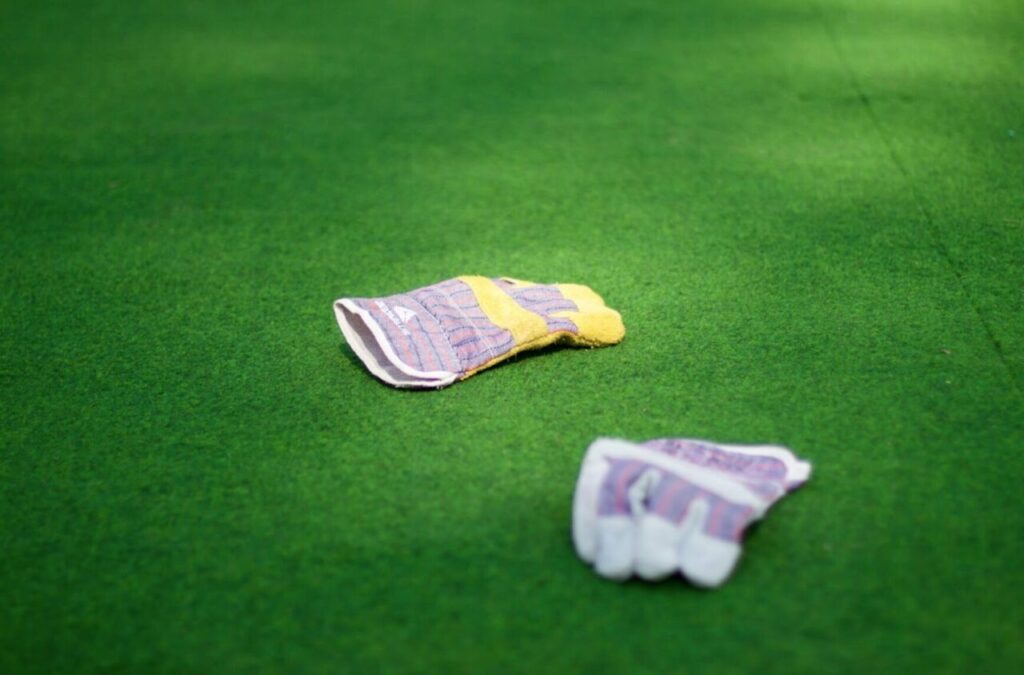Have you ever wondered, as you sweat bullets mowing the grass, if you would be better off having an artificial lawn?
I mean, who doesn’t hate mowing grass?
Artificial grass is becoming more popular, but that doesn’t mean you’ve got to go out and get some for yourself…there are pros and cons that will help you decide whether or not it will suit your needs.
Lucky for you, we’ve put together a list of the pros and cons, so you don’t have to scour the web for the answer!
What is Artificial Grass?
Before we dig into the specifics, let’s start with what I mean by “artificial grass”.
Also known as synthetic turf or “fake grass,” this product is designed to mimic the feel and look of real grass and can be used in place of the real thing.
Since it was first introduced in the 1960s, manufacturers have improved upon the concept, making it no longer just the purview of sports arenas but a popular choice for residential landscaping as well.
Artificial grass is typically composed of synthetic materials such as polyethylene, polypropylene, and nylon, often mixed with different recycled materials.
Manufacturers will include a backing material and fill in the space between the grass layer and the backing with materials such as sand and/or rubber to add cushion and help the blades stand upright, which adds to the appearance of real grass.
Pros of Artificial Grass
Low Maintenance
Of course, this is the first thing that might come to mind when considering artificial grass. There’s no question that artificial grass requires less maintenance than a natural lawn.
It saves you time and money, as you don’t have to buy and replace lawnmowers, gas, etc., to maintain the appearance of your lawn.
Water Conservation
It’s no joke; water scarcity is a thing, especially in some drought-prone regions of the country.
An artificial lawn doesn’t need to be watered, so it can really help reduce water usage, which is good for both your wallet and the environment.
Durability and Longevity
Artificial grass is designed to be tough and durable. No more worn-out grass patches or ugly weeds marring the beauty of your lawn.
Many artificial grass products are said to last 15 to 25 years when maintained properly, which is much longer than a typical natural lawn.
Aesthetic Appeal
Green grass year-round?
Yes! If you enjoy the look of beautiful green grass in every season, this option will provide it for you.
No more brown patches in summer or muddy areas after rain!
Artificial grass is also available in many different colors and styles, letting you choose the look that’s perfect for your home.
Pest Resistance
No more ticks and chiggers? Yes, please!
Common lawn pests are not interested in your artificial lawn, so you won’t need to deal with these critters.
You can enjoy spending time outside without worrying about the use of potentially harmful chemicals and pesticides.
Cons of Artificial Grass
Upfront Costs
Although using artificial grass can save you money over time, the upfront costs can be high and will vary depending on factors such as your lawn size and any needed ground preparation (e.g., smoothing out rough areas).
Before investing in artificial grass, you should weigh the costs against the savings it will make on things like water, maintenance, and equipment over the long term.
Heat Retention
An unfortunate drawback of artificial grass is direct sunlight’s impact on it. Put simply, you won’t want to walk barefoot on a hot summer day!
There are, however, ways to mitigate this with specialized cooling products or strategic shade placement.
Environmental Concerns
Aside from water conservation benefits, there are potential environmental impacts to using artificial grass.
Also, there are some concerns about its impact on local ecosystems and biodiversity, as even those pesky insects are necessary for the health of the environment where they live.
As it’s made from plastics, artificial grass is not biodegradable. This means that once the lawn has reached the end of its life, you will need to find a way to dispose of it.
If you’re considering artificial grass, it’s worth your time to research the latest developments in eco-friendly options and proper disposal methods.
Limited Natural Benefits
We may not think about it, but natural grass has environmental benefits that artificial grass simply can’t provide.
For example, like trees, your natural lawn releases oxygen absorbs carbon dioxide and supports soil health.
It also contributes to local ecosystems, providing habitats for insects and small wildlife. However, by installing artificial grass, you may be reducing these natural benefits in your immediate environment.
Installation Challenges
Installing artificial grass is probably best left to the pros as it requires proper ground preparation, precise cutting and fitting, and specialized tools.
Making the Decision
Before making the switch to artificial grass, take some time to assess your specific situation. Things to think about include:
- ⬥ Your lifestyle and how you use your outdoor space
- ⬥ Local climate and water availability
- ⬥ Maintenance time you’re willing to invest
- ⬥ The specific areas of your yard that might benefit from artificial grass
Alternatives to Artificial Grass
If you’re not entirely sold on artificial grass but still want to reduce your lawn maintenance, consider alternatives like:
- ⬥ Native plant landscaping
- ⬥ Xeriscaping (low-water landscaping)
- ⬥ Combining small areas of artificial grass with natural elements
These options can provide a balance between low maintenance and natural beauty.
In conclusion, while artificial grass offers benefits such as water conservation and year-round beauty, it also comes with drawbacks like a significant upfront investment and potential environmental impacts.
The right choice for your lawn depends on your specific circumstances, priorities, and values.
Clover Lawns: The Eco-Friendly Alternative?


